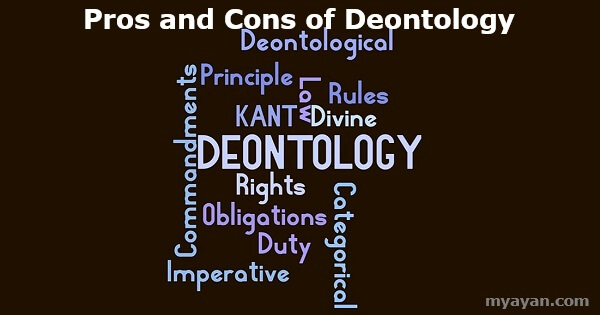No matter how much the world advances, ethics are and will always be vital in everyone’s life. Ethics and morality are both part of philosophy. Not many people are aware that deontology is one of the popular theories in philosophy is. It is often used to determine what is right or wrong based on a set of rules. In simpler words, this theory can help decide how moral or ethical you are. Despite its popularity, there are both pros and cons of deontology. But before you understand the god and the bad of this theory, it’s important to understand the theory itself.
Deontology refers to a branch of ethics that examines the nature and meaning of morality. It is based on the idea that character should be determined by universal principles such as fairness, justice, and honesty. The main goal of deontology is to promote ethical behavior in all aspects of life. When making decisions, it is essential for you to consider the implications for the rights and interests of others.
At its core, deontology is concerned with moral duties and obligations that are required of all people. This includes commitments to oneself and to other individuals and society as a whole. It also involves understanding how your actions can affect the world around you. Deontology implies that your responsibility is to do what is right, even if it goes against your desires.
Deontology differs from other ethical theories, such as utilitarianism and virtue ethics, focusing on moral duties and obligations rather than outcomes. Therefore, even if a particular action may have positive results, it can still be considered wrong if it violates someone’s rights.
Some of the pros of deontology include:
Deontology provides objective and clear standards to determine an ethical action. You need to use reasoning to differentiate right or wrong based on principles rather than subjective personal opinions. This clarity is essential in situations where emotions may hinder your judgment.
Deontological ethics emphasizes respect for individuals regardless of culture, race, or gender. This principle goes along with the idea of the inherent dignity of all persons and encourages equality and fairness in society.
The theory is also universal, as it applies to all people, regardless of their background or social status. It emphasizes the importance of treating everyone with equal respect, fairness, and dignity.
Deontological principles provide a strong foundation for morality as it considers all persons to be equal and is based on principles that are generally accepted. This helps ensure that ethical actions are consistent and that no one is able to take advantage of others.
Deontology is consistent in the sense that it allows one to make decisions based on principles rather than personal opinions. This ensures that ethical decisions are made without any bias and are aligned with an individual's moral beliefs.
Some of the cons of Deontological are:
The most significant drawback of deontology is that it is rigid and may fail to evoke empathy. This is because it prioritizes rules over individual cases and circumstances. Sometimes there may be exceptions to these rules, and deontology may not allow for that.
Another disadvantage of deontology is that it does not account for situational context. Every situation is different, and it is difficult to apply a standard rule in every context. This is where other ethical theories like consequentialism may be helpful.
Deontology often adheres to principles, making it less personal and more distant. This may make it challenging to achieve certain ethical values such as compassion, kindness, and care.
Deontology does not allow for any flexibility because it is based on principles. This can lead to ethical decisions that do not account for the individual and may be out of touch with reality.
Reaching consensus when adhering to deontology can be difficult due to its rigidity. People might have different interpretations of the same rule and disagree on what is right or wrong in a particular situation. This can lead to conflicts and moral disagreement.
Conclusion on the Pros and Cons of Deontology
Deontology is a fascinating theory that provides objective standards for ethical actions. While it has several positives, it also has some negatives, such as its rigidity and lack of situational context. It is generally recommended to use deontology along with other ethical theories and to consider context when making ethical decisions. As people continue to explore different ethical theories, they can gain a more comprehensive understanding of the world and make better decisions.

Disregarding the consequences can lead to disastrous outcomes. With no flexibility, deontology disregards the individual's ability to consider the circumstances or consequences of their actions. Intuitively, we recognize that certain rules may have reasonable exceptions. For instance, there are situations where telling a lie becomes necessary to protect others.
Unlike many other ethical theories, deontology takes a different approach. It doesn't solely focus on the consequences of individual actions. In fact, personal emotions behind actions are considered irrelevant in Kantian deontology. According to Kant, humans don't always have rational control over their feelings. It's an intriguing perspective that challenges our traditional understanding of ethics.
Deontology, an intriguing ethical theory, asserts that actions are deemed good or bad based on a clear set of rules. Derived from the Greek word deon, meaning duty, it emphasizes that ethical actions align with these rules, while those that deviate are considered unethical. Dive into the fascinating realm of deontology and discover the intricate interplay between rules and morality.
The paradox of deontology is said to arise with any agent-centered restriction. It's not just about restrictions or reasons against killing, but also reasons against promise-breaking, deceiving others, or torturing them (and possibly many others).
Being honest is important, even when it might have negative consequences. So, it wouldn't be right for a boy to fib about taking a candy bar from the store.